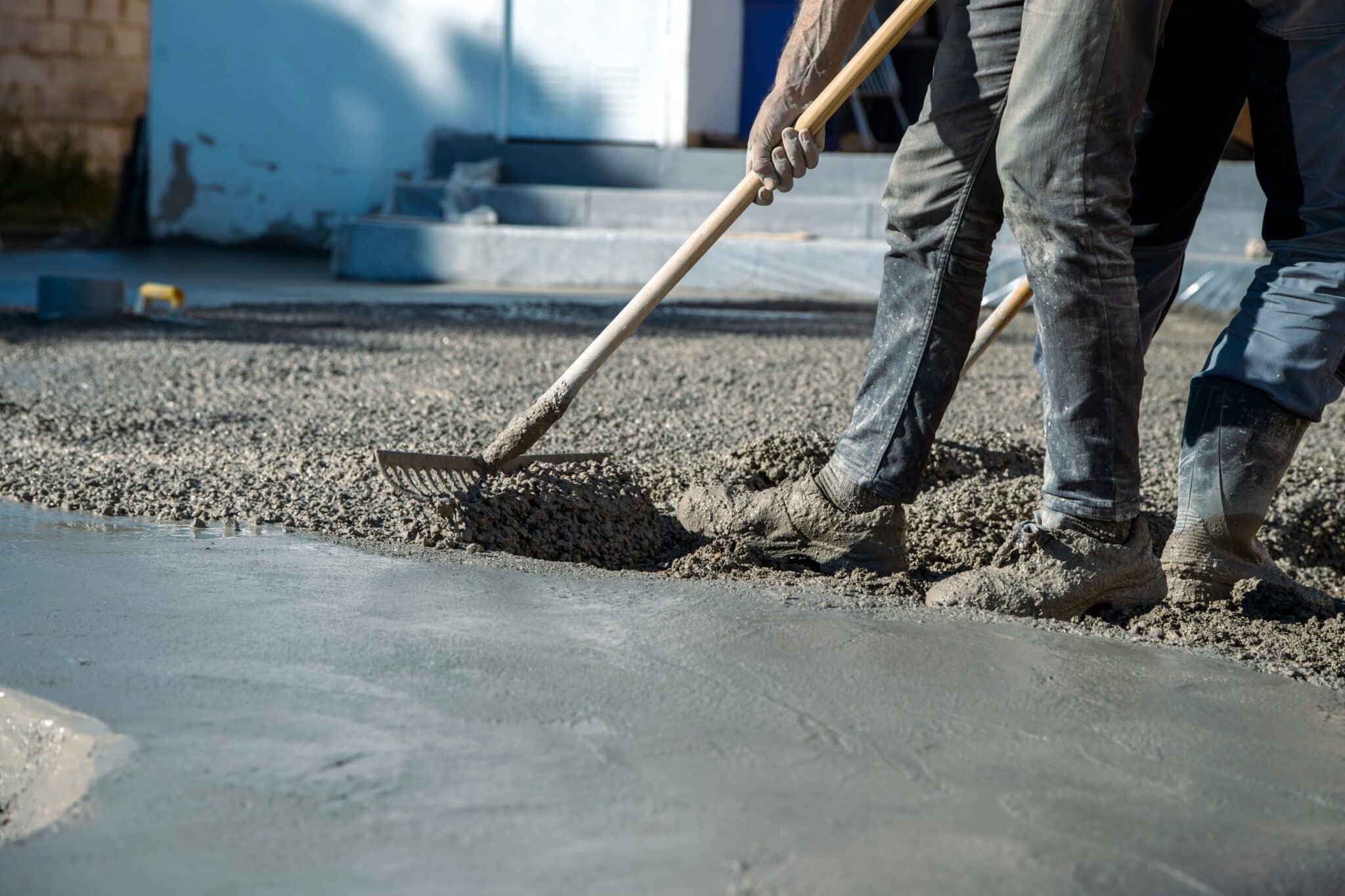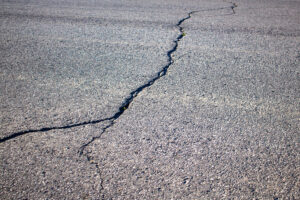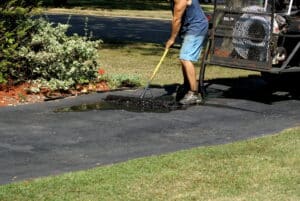When it comes to driveways, parking lots, and other outdoor surfaces, there are two main types of materials that people use: asphalt and concrete. Both have pros and cons, but which is the best for your needs? In this article, we will discuss the differences between asphalt and concrete surfaces so that you can decide what to use for your property.
What is asphalt?
Asphalt vs. concrete; what is the main difference? The difference is in the binding agent used to hold the aggregate (crushed sand) together. Generally, asphalt is used for roads, parking lots, pavement, and driveways because it is cheaper by the square foot, easier to repair, and more resilient to oil stains and other harsh environmental factors. Asphalt driveways are great for staying under a certain budget.
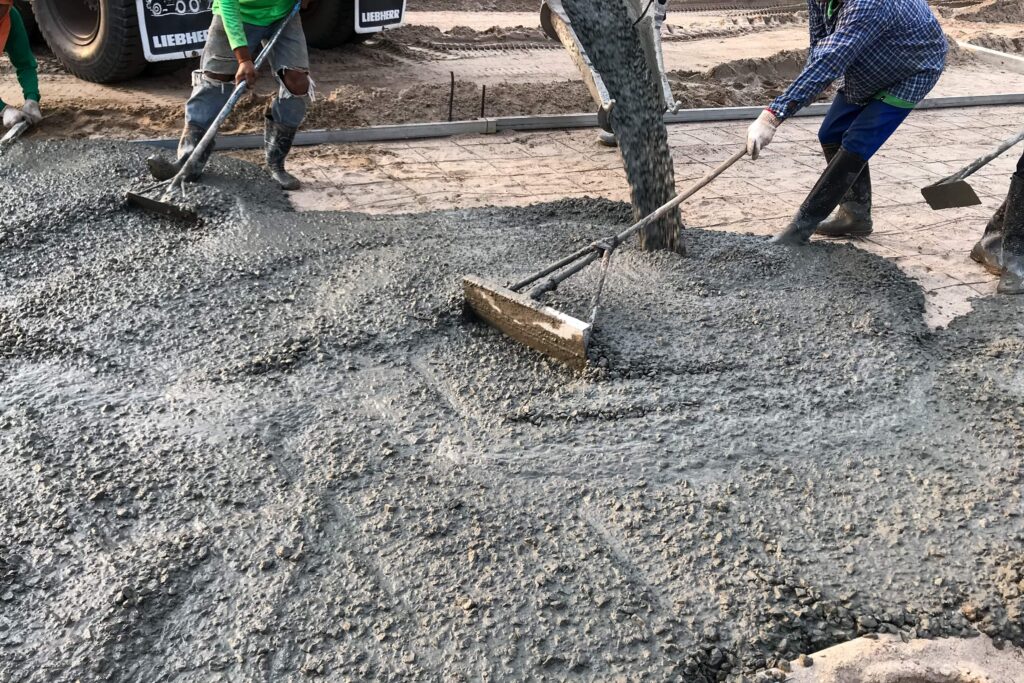
Read more: 7 Different Types of Asphalt: Everything You Need to Know
What is asphalt made of?
Both asphalt and concrete are made of a mixture of materials such as crushed sand or gravel and a petroleum-based binding agent. The mixture is then called “aggregate.” Aggregate is the main paving material used for both asphalt driveways and pavements.
The binding agent used in asphalt is more viscous and durable. The viscosity and nature of asphalt means that it can cure much faster and is ready to be driven off after the curing time. It also makes the pavement durable and easy to repair – patch jobs are common in asphalt pavement, but they are cheaper and easier to do.
How Asphalt is Made
Asphalt is made by distilling crude petroleum and mixing it with aggregate. Before mixing begins, both materials must be superheated. Because of the nature of asphalt pavement, the materials can be 100% recycled – resulting in an environmentally friendly, efficient, durable, long-lasting, budget-friendly, and high-quality road, driveway, or parking lot.
What is concrete?
Now that you have a fundamental understanding of asphalt pavement, let’s look at what concrete is and why you would use it in place of asphalt.
One important fact to remember when comparing asphalt vs. concrete is that the materials are mostly the same, but cost, purpose, and longevity differ. Why is that? Let’s break it down.
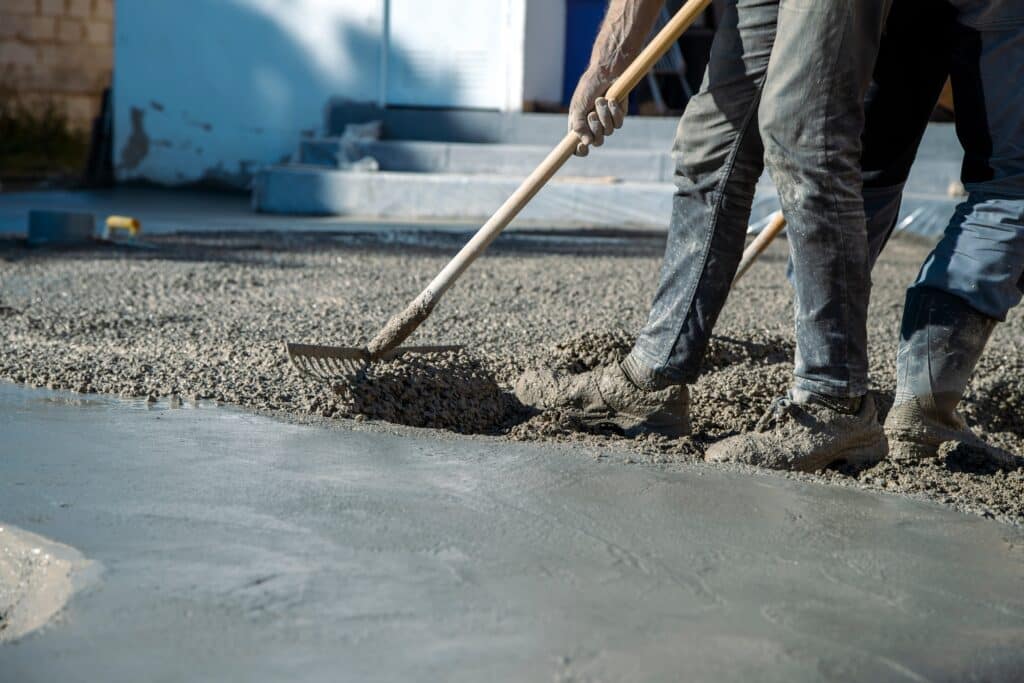
What is concrete made of?
Concrete is like asphalt in that it is made of gravel, but instead of being held together by a petroleum-based binder, it is bound by cement. Cement is essentially just a mixture of water, rocks, and clay to simplify it. Unlike asphalt, cement is poured cold – making the curing time much longer.
How Concrete is Made
To make concrete, you must first make cement. Cement is made by mining minerals like:
- Limestone
- Clay
- Gypsum
- Shells
- Chalk
- Slate
- Silica sand
- and many more materials
Once the mined materials are collected, they are crushed into an almost powder consistency and then superheated before being packed and distributed. From there, concrete is formed by mixing the cement with water, aggregate, and a binder.
So why use a concrete driveway over an asphalt driveway? When would you ever make a concrete road over an asphalt road? And more importantly, what is the asphalt vs. concrete cost, and which is better for a pavement project? Let’s break down the benefits of the two materials.
Benefits of Asphalt
Here are the benefits of an asphalt driveway vs. concrete:
- More durable to the elements (weather, temperature fluctuations, spills, stains, etc.)
- More budget friendly
- Easier to repair and patch
- Can shrink and expand with the temperature
- Although cheaper, can last several decades with proper care
- Faster curing time and can be driven on almost immediately after
- More resilient to oil and grease stains
However, there are some flaws that you will need to be aware of. These include:
- Less longevity compared to concrete
- Cannot personalize
- Rougher edges
- Not as visually appealing
- Requires sealcoating every few years
- Less resilient to high temperatures
Benefits of Concrete
Here are the benefits of a concrete driveway:
- Has a much longer overall lifetime
- Sealcoating is not required (but will extend its lifetime)
- Can be personalized with stamped concrete
- Much nicer and cleaner looking
- More resilient to high temperatures
And here are the downsides:
- Cracks in very cold climates and sometimes at very hot temperatures
- Salt and deicers will damage it
- Repairs are more costly and patch jobs are less feasible
- Much longer curing time – can take over a week before it can be used
- Will show oil and grease stains
Should you choose asphalt or concrete for your home or business project, and why?
When choosing the right material for your job, you’ll want to account for asphalt driveway cost vs. concrete cost. You’ll also want to plan proper maintenance and care for your pavement.
With an asphalt driveway or road, you can expect a relatively low cost; it is usually less than $5 per square foot of asphalt. This means that asphalt is ideal for projects where large land areas must be paved.
Asphalt also has a much faster curing time, so asphalt should be used in projects with a tight deadline, or the client needs the driveway to be finished as soon as possible.
Also, recall that asphalt is more resilient to temperature fluctuations – especially in colder climates. Think about pavement longevity in the climate when considering which material to use.
On the other hand, concrete should be considered for driveways. They can be personalized, look cleaner, and have sharper edges, which means it is perfect for private property, driveways, and smaller roads.
Concrete roads can be considered if the climate is ideal (not too hot or cold). With concrete, you can also expect a much longer lifetime with less need to maintain it, so consider it for commercial districts as well. Just be aware that concrete will take over a week to cure, so it won’t be usable until it finishes the curing process.
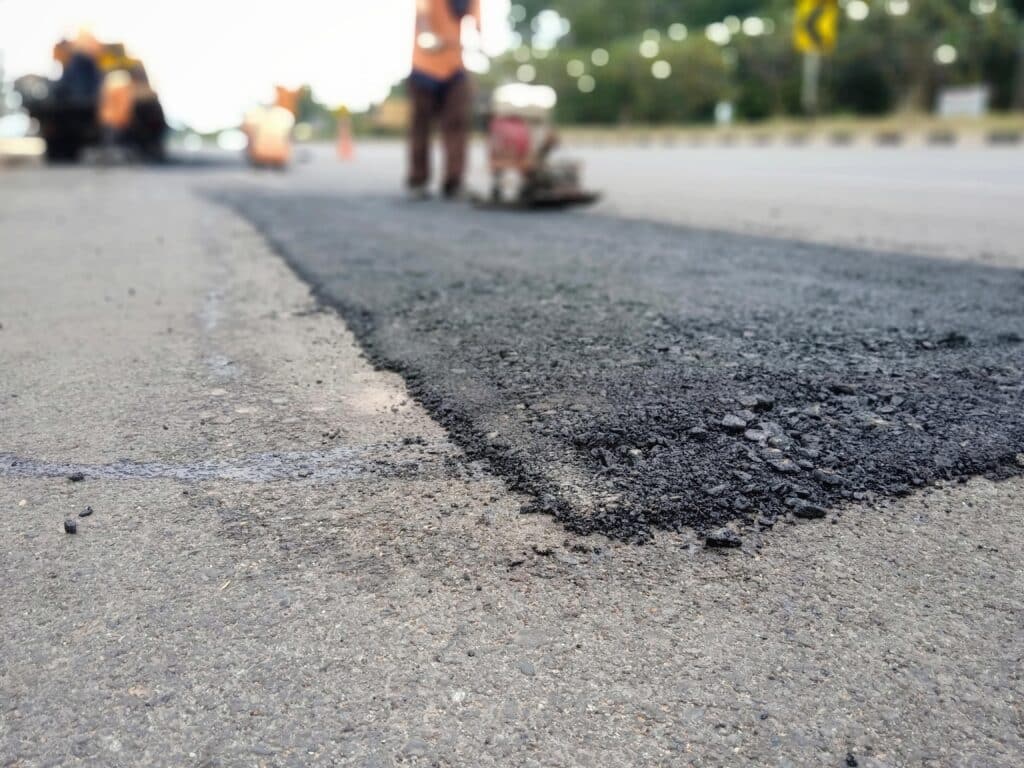
Asphalt Repair and Maintenance for your Property
Now that you know the differences between asphalt vs. concrete, you’ll be able to decide which material to use for your project. Here is some final information about asphalt and concrete that will ensure it lasts for decades.
Sealcoating
Before you begin your asphalt pavement project, choose the right sealcoating. Also, consider investing in an asphalt sealcoating additive to prolong the life and quality of your sealer. Reapply sealant to your asphalt every 3-5 years for the maximum longevity of your pavement. For concrete, although it isn’t necessary, sealcoating will preserve its quality and protect it from the environment. It can be applied every 5-8 years to maintain its durability.
Cleaning
Regular cleaning of your concrete will help it maintain its pristine appearance and leave your concrete driveway or road looking great. One popular method of cleaning concrete these days is to power wash it. Always clean stains from concrete immediately as soon as you notice them. Many of the same principles as cleaning concrete will apply when cleaning asphalt. Clearing debris from your asphalt is essential to maintaining vehicle traction.
To learn more about keeping your asphalt driveway looking pristine, read our article Expert Asphalt Cleaning Tips for Driveways.
Curing
Both asphalt and concrete need time to cure. Although asphalt can be driven on as soon as curing is finished, you should be aware that the asphalt will not be completely set for several months. During this period, avoid parking on the asphalt for extended periods, and avoid leaving extremely heavy objects on the asphalt. These same principles apply to concrete.

Superior Asphalt Is Here to Help
When it comes to keeping your property looking great, asphalt repair and maintenance are key. Asphalt can crack and damage without proper care, leading to an unsightly property. Superior Asphalt, LC is here to help with all your asphalt needs. We are a full-service asphalt company that offers asphalt repair, maintenance, and installation services for residential and commercial properties. We also provide asphalt sealing and coating services to protect your asphalt surface from the elements.
If you’re interested in learning more about our asphalt services, contact us today!

